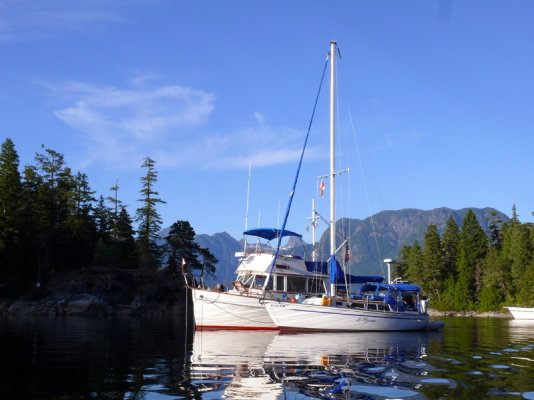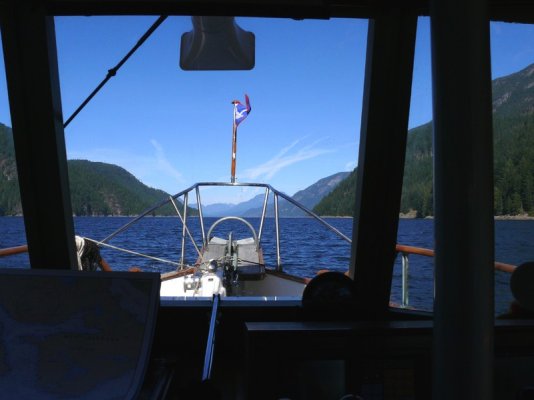Ok , so what is your point....
I think the single vs twin argument is the most pointless discussion on the planet after the one defending the Tea Party.
My point was that--- according to the broker--- most of the GB buyers that have paraded through the local dealer mostly seem to WANT twins but some will SETTLE for singles because their purchase prices are lower.* I have talked to some of these buyers and they are almost appologetic abut the fact that they bought a single.* Given the cost of GBs and the perhaps typical profile of the buyers of newer GBs, this may well have more to do with status than with actual operating costs and advantages/disadvantages.
As I've stated before, I have no preference for singles vs twins outside of the fact that I like running engines so the more of them the better.* The added fuel cost of a twin is irrelevant to the way we operate our boat. The added fuel cost of the second engine is such a tiny fraction of our overall ownership costs we virtually ignore it.* Were we into crossing oceans and stuff, the efficiency of a single would make it the only logical choice.* But we're not.
There are times when the added maintenance/repair costs are not insignificant, as when we had all the engine mounts replaced and both exhaust systems.* Or props tuned or shafts replaced.* But these are not regular occurances.* Buying two raw water impellers instead of one is an insignificant cost increase, buying 24 quarts of oil instead of 12 every 100-200 hours is another one.* So is buying two sets of oil filters instead of two.
So outside of the major work, the operating costs of twins vs. singles (assuming the same engine type) is not worth bothering about in our opinion.
What is FAR, FAR more important than the additional cost of operating the second engine is that both of us, and my wife in particular, feel more confident with a second engine under the floor.* Particularly when the engines in questions are 37-year old relics that should have been retired to an exhibit in the*London Science Museum*decades ago.
As I've said before, we've flown a single-engine floatplane with an "ancient" engine up and down the Inside Passage more times than we can remember and never once worried about having only one engine.* But with the boat, we prefer the redundancy.* We like not having to rely on commercial tow services if we have a problem.* We've needed the spare engine four times since owning the boat, and each time we completed our journey with no hassles and no expensive tow lines.* Some areas where we boat have good commercial towboat coverage, some have no coverage at all.* Given the currents and the very real possibilty of being carried into something unyielding if the only engine quits, we like having the second engine to virtually eliminate that possibility.*
As I've said, I know or have met far more people who've had to shut down their only engine because of damage to or fouling of their prop or rudder than I know people with twins who had to shut an engine down for the same reason.* This despite the obvious fact that the shafts, props, and rudders of a twin are far more exposed.* I'm sure others can quote the opposite observation, but that's been ours.
So based on our experience and observation over the last twelve years my summary opinion of twins vs singles is that for all practical purposes, it doesn't make any difference what you have.* The cost differences are largely hypothetical or blown out of proportion by armchair theories.* I believe the running gear vulnerability has far more to do with how the boat is operated and the vigilance of the operator rather than the actual location of the running gear.
The maneuverabily differences are insignificant to non-existant.* Carey and I watched the skipper of a single engine river tug (standard prop and rudder, nothing fancy, 12V-71 Detroit engine, no thruster) maneuver the new breakwater/dock for the Ganges Marina into position one night and that guy did things with his tug that an experienced recreational boater couldn't come close to duplicating with a twin engine boat.* Carey is a far better boat handler in his single-engine custom lobsterboat than I am in our GB twin.* It's got nothing to do with the number of engines, props, or rudders.* It's because he's a far better boat handler than I am.** Yes, his boat has a bow thruster but I can count on one hand the time's I've seen him use it.* On the other hand, I can put a 70', 25-ton, single engine narrowboat wth tiller steering anywhere I want to put it on the UK canals because I've done it a lot and I understand how the boat pivots, how it's mass reacts with inertia and so on.
I think there are only three truly valid arguments when it comes to how many engines are best.* First is the design of the boat.* Some designs only work with one engine installation.* Most commercial fish boats, lobsterboats. most displacement recreational boats like Willards, Krogens, Nordhavn's, the various "tug" designs, etc.* Sticking in a second engine and running gear would seriously mess up the design and the allotment or use of spaces inside the boat.
Second, if very long distance cruising is the objective.* While I believe the fuel costs between singles and twins is not worth bothering about for local and coastal cruising, it can become a factor in long-distance cruising.* Even more important is fuel storage.* If you can't carry enough fuel to feed the engine(s) over the distance, you can't go.* Add to this the fact that most powerboat designs for long distance cruising are better suited for--- or can only accomodate--- one engine, this configuration makes the most sense.
Third, speed.* If you're in a hurry, more engines will get you there faster.
Other than those three things, I believe singles vs. twins is six of one, half dozen of the other.
*
-- Edited by Marin on Tuesday 18th of May 2010 05:24:51 PM



